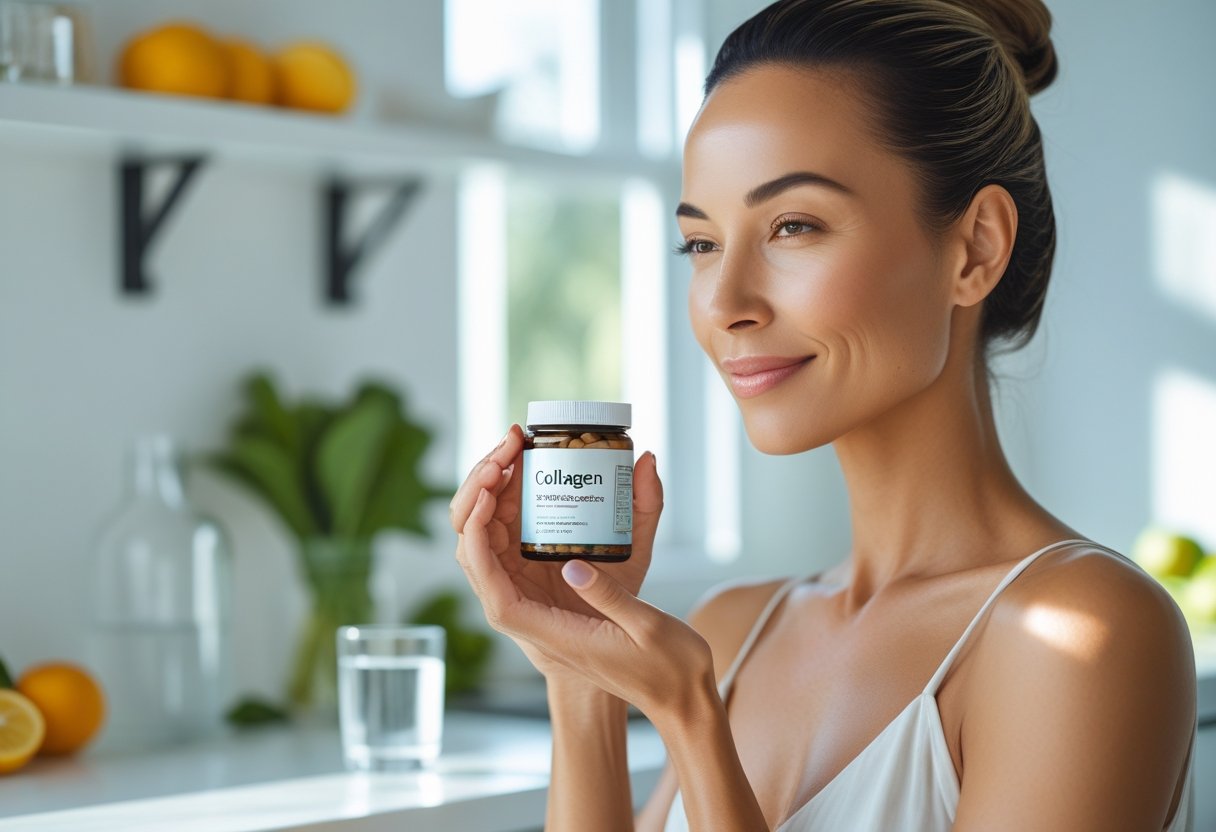Collagen is a key protein that supports skin, hair, joints, and overall health. Women often look for supplements to help with aging, skin elasticity, and joint strength. The challenge lies in choosing the right type of collagen since there are many kinds, each serving different purposes.

Type I collagen is generally the best choice for women because it provides the widest range of benefits for skin, tendons, and ligaments. This type is the most abundant in the body and plays a major role in maintaining healthy skin and connective tissues.
Other types, like Type II, are more focused on joint health, while Type III supports skin and muscles but is less common in supplements. Knowing which collagen type to use can help women get the most from their supplements and target their specific health needs. For more details about types and benefits, see the information on the best collagen for women.
Understanding Collagen Types

Collagen is made up of different types, each serving a specific role in the body. Some types support the skin and tissues, while others are key for joints and cartilage. Knowing the differences can help women choose the right collagen for their health needs.
Type I Collagen
Type I collagen is the most common form in the body, making up about 90% of the collagen in skin, bones, tendons, and connective tissue. It provides strength and structure. This type helps keep skin firm and is important for bone health.
Women often seek Type I collagen to improve skin elasticity, reduce wrinkles, and support bone density. It is mostly found in supplements labeled for skin and beauty benefits. Type I collagen is usually derived from bovine (cow) or marine (fish) sources because they have high amounts of this type.
Type II Collagen
Type II collagen is found mainly in cartilage, the smooth tissue that cushions joints. It is essential for joint health and flexibility. This type helps reduce joint pain and supports cartilage repair.
Women experiencing joint stiffness or arthritis may benefit from Type II collagen supplements. It usually comes from chicken sternum cartilage. Unlike Type I, Type II collagen focuses more on mobility rather than skin or bone support.
Type III Collagen
Type III collagen works alongside Type I in soft tissues like skin, muscles, and blood vessels. It aids skin elasticity and helps tissues heal after injury.
Women may look for Type III collagen to improve skin texture and support healthy blood vessels. It is often found together with Type I in supplements because they complement each other’s functions. Sources are usually similar to Type I, from bovine or marine origins.
Other Collagen Types
Besides Types I, II, and III, there are smaller amounts of Types IV, V, and X, which have more specialized roles. Type IV supports the layers under skin cells, helping with filtration in organs like kidneys. Type V plays a role in forming cell membranes, and Type X supports bone growth.
These types are less common in supplements but still important in the body’s overall collagen network. Most women focus on the main three types for skin, joint, and tissue health.
Understanding these key types helps women choose collagen products that best target their specific health goals. For details on collagen types and benefits, see Types of Collagen Explained.
Benefits of Collagen for Women

Collagen plays an important role in various parts of the body, especially as women age. It supports the skin, hair, nails, joints, and bones, helping maintain strength and appearance. Adding collagen can help address natural declines caused by aging or lifestyle factors.
Skin Health and Anti-Aging
Collagen is a key protein that keeps the skin firm and hydrated. As collagen levels drop with age, the skin can become dry and develop fine lines or wrinkles. Supplementing collagen can improve skin elasticity and increase moisture retention.
Research shows collagen may reduce visible signs of aging by plumping the skin and smoothing fine lines. It helps maintain skin structure and promotes a healthier, more youthful look. This effect is especially important for women who want to slow skin aging naturally.
Hair and Nail Support
Collagen supports the structure of hair and nails by providing essential building blocks. Women taking collagen often see improvements in hair texture and strength. Nails also grow stronger and are less likely to break.
Collagen helps repair damaged hair and prevents brittleness. It supplies the amino acids needed for keratin production, which is vital for healthy hair and nails. Regular collagen intake can reduce hair thinning and nail splitting caused by age or stress.
Joint and Bone Strength
Collagen makes up a large part of cartilage and bone, so it is crucial for joint comfort and bone health. Women may experience joint stiffness or bone density loss as collagen production slows over time.
Adding collagen supports joint integrity by maintaining cartilage and reducing wear. It can also help maintain bone strength and reduce the risk of fractures. Collagen supplements are a valuable protein source for women aiming to protect their bones and joints during aging.
For more details on collagen’s role in women’s health, see this collagen benefits article.
How to Choose the Best Collagen Supplement

Choosing the right collagen supplement means looking closely at where it comes from, the form it takes, and what extras it may contain. Knowing these details helps match the product to specific health needs and ensures better results.
Source: Bovine vs. Marine Collagen
Bovine collagen comes from cows and mainly contains Type I and III collagen. These types support skin, hair, nails, and joint health. It’s often cheaper and widely available.
Marine collagen is made from fish skin or scales and mostly has Type I collagen, which is the most abundant in the human body. It is known for better absorption but can cost more. Marine collagen suits people who want targeted skin benefits.
Women may choose marine collagen if they prioritize skin elasticity. Bovine collagen is good for broader support including joints. People with fish allergies should avoid marine collagen.
Collagen Peptides vs. Gelatin
Collagen peptides are broken-down collagen, making them easy to digest and absorb. They dissolve well in both hot and cold liquids, making them convenient for daily use.
Gelatin comes from cooked collagen and gels when cooled. It works well in recipes but is less versatile for drinks. Gelatin supports digestion and gut health but is slower to absorb than peptides.
For everyday supplementation, collagen peptides are usually preferred. Gelatin can be added to meals for those who want added digestive benefits but is not as effective for skin or joint support.
Purity and Additives
Purity matters to avoid unwanted chemicals. Look for collagen supplements that have third-party testing or certification to ensure safety and quality.
Avoid products with added sugars, artificial flavors, or fillers. These can reduce the supplement’s effectiveness and possibly cause side effects.
Vitamin C is a beneficial additive because it helps the body use collagen better. Choosing unflavored, pure collagen peptide powders with vitamin C can optimize results without extra ingredients.
For cleaner options, check labels closely and choose products with minimal, natural ingredients. This reduces risk and improves supplement efficiency.
For more details on choosing collagen types and qualities, see this overview of collagen supplements.
Comparing Collagen Forms
Different collagen supplement types have unique features affecting cost, absorption, and convenience. Knowing these differences helps in choosing the right form.
Powder vs. Capsule
Powdered collagen is usually less expensive than capsules. For example, taking 10 grams of collagen in pill form might cost around $1.25, while the same amount in powder could be about $0.75.
Powdered collagen is broken down, which helps the body absorb it faster. It mixes easily with water or smoothies, making it convenient for those who prefer drinks.
Capsules are easy to carry and take, especially for people who dislike mixing powders. However, they often contain smaller doses, so multiple capsules might be needed for one serving.
Liquid Collagen
Liquid collagen is pre-digested, which means it can be absorbed quickly by the body. This form often includes added vitamins or ingredients to support skin and joint health.
It is ready to drink, so there’s no need to mix or swallow many pills. This can be helpful for people who want fast and easy use.
However, liquid collagen tends to cost more than powders or capsules. It may also have a shorter shelf life once opened, so it requires timely consumption.
For those prioritizing quick absorption and ease, liquid collagen is a practical choice despite the higher price.
Powder vs Pills vs Liquid: Comparison of Collagen Supplement Forms provides a detailed cost and absorption comparison.
Important Ingredients to Look For
Certain ingredients in collagen supplements can boost their effectiveness. These ingredients help the body use collagen better and support skin health in specific ways.
Vitamin C
Vitamin C is essential for collagen production in the body. It helps turn the amino acids proline and lysine into collagen, supporting skin strength and elasticity. Without enough vitamin C, collagen synthesis slows down, which can affect skin health.
Many collagen supplements include vitamin C to improve results. It also acts as an antioxidant, protecting skin cells from damage caused by free radicals. This protective role may help reduce signs of aging.
Users should check the label to ensure vitamin C is part of the formula. The right amount enhances collagen absorption and supports overall skin repair.
Hyaluronic Acid
Hyaluronic acid helps keep skin hydrated by holding onto moisture in skin cells. This moisture boost makes the skin look fuller and smoother. It works alongside collagen to improve skin elasticity.
Studies have shown that taking hyaluronic acid orally can increase skin hydration and reduce fine lines. This makes it a useful ingredient for those focused on skin appearance.
Including hyaluronic acid in a collagen supplement can improve skin texture and softness. It supports the body’s natural ability to maintain moisture and youthful skin.
For readers seeking better skin hydration and elasticity, a supplement combining collagen with hyaluronic acid may offer added benefits.
For more details, see 6 ingredients to look for in a collagen supplement.
Safety, Dosage, and Potential Side Effects
Collagen supplements are generally safe for most women when taken correctly. However, knowing the right dosage and understanding possible allergic reactions or interactions with other substances is important for safe use.
Recommended Daily Dosage
The typical safe dose of collagen peptides ranges from 2.5 to 10 grams daily. Most studies suggest that taking about 5 grams per day is enough to support skin and joint health.
Higher doses do not always mean better results. It’s best to follow the instructions on the product label or consult a healthcare provider.
Hydrolyzed collagen, or collagen peptides, are easier to digest, making them the preferred form for supplements.
Avoid exceeding recommended doses to reduce the risk of unwanted effects.
Potential Allergies and Interactions
Collagen supplements can cause allergic reactions in some people. Those allergic to fish, shellfish, or eggs should check the collagen source, as many come from these.
Mild side effects such as digestive upset, bloating, or a bad taste in the mouth can occur but are uncommon.
Collagen is not known to interact with most medications, but combining it with other supplements could increase side effects.
Women using blood thinners or those with specific health conditions should talk to a doctor before starting collagen supplements.
Being aware of these risks helps ensure collagen is used safely and effectively. For more details about side effects, see this overview of collagen peptides.
Maximizing Results From Collagen
To get the most benefit from collagen, attention to how it is taken and daily habits is essential. Proper timing, dosage, and pairing with certain nutrients improve absorption. Meanwhile, lifestyle choices can help protect the body’s natural collagen and support its production.
Best Practices for Absorption
Collagen supplements are best absorbed on an empty stomach, ideally 30 minutes before a meal. This helps the body break down collagen peptides more efficiently. Most studies recommend a daily dose between 2.5 to 10 grams for visible effects.
Vitamin C is crucial for collagen synthesis, so taking collagen with vitamin C-rich foods or supplements boosts results. Avoiding excess caffeine and sugar after taking collagen also helps, as they can interfere with collagen formation. Hydration supports skin elasticity, so drinking enough water aids collagen’s effects on the skin.
Lifestyle Factors
Smoking reduces collagen production and damages existing collagen fibers, so quitting smoking helps protect skin and joints. Sun exposure breaks down collagen through UV damage, so regular use of sunscreen is important.
A balanced diet rich in protein, antioxidants, and healthy fats supports collagen maintenance. Stress management and moderate exercise also play roles; high stress and lack of movement can speed collagen loss.
Focusing on these habits helps preserve and enhance the benefits of collagen supplements. For deeper reading on collagen types and benefits for women, visit What Is the Best Collagen for Women? Types, Benefits & More.

1 comentário em “Collagen: What Is the Best Type for Women and How to Choose It Effectively”